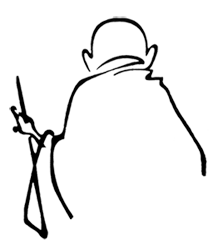
P.O. SEVAGRAM, DIST.WARDHA 442102, MS, INDIA. Phone: 91-7152-284753
FOUNDED BY MAHATMA GANDHI IN 1936
ARTICLES : Gandhian view on Economics
Read articles written by very well-known personalities and eminent authors about Gandhian view on Economics and it's relevance today.

ARTICLES
On Economics
- Managing Rural Economy In Gandhian Way
- Redressing The Balance Between Rich And Poor
- Gandhi And Buddhist Economics
- Economic Freedom, Technology and Ecosystem
- Gandhi : A Unique Practical Economist
- The Cow In Our Economy
- Constructive Programme: Its Meaning and Place
- Gandhi's Views on Economics
- Gandhian Perspective on "Convergence of Values: Spiritual, Political and Economic"
- Relevance of Gandhi's Views on Economic Development
- The Relevance of Gandhian Economics to Modern India
- Economic Reform and Social Degradation
- Gandhian Economy and The Way to Realize It
- Gandhian Way Inevitable
- Towards Understanding Gandhian Economics
- Relevance of M. K. Gandhi’s Ideal of Self-Sufficient Village Economy in the 21st Century
Further Reading
(Complete Book available online)- From Mind of Mahatma Gandhi
Redressing The Balance Between Rich And Poor
By Cecil Evans
This is the text of one of the talks given at the Anniversary Service on 30 January 1999 by Cecil Evans
A recent Government report written by Sir Donald Acheson, the former Chief Medical Officer for the United Kingdom, emphasized that poverty is a killer. The report said that poverty is the underlying cause of many early deaths and of poor health.
However, the report unfortunately did not go so far as to recommend higher taxes for the better off so as to close the wealth and health gap between rich and poor in this country.
I should like to speak briefly about Mahatma Gandhi’s views on poverty and injustice and relate them to the views of a contemporary Portuguese novelist, Jose Saramago, who won the Nobel Prize for Literature in 1998.
The two supreme values for Gandhi were truth and nonviolence. One of his greatest insights was to understand that violence was linked to poverty and injustice, which are sometimes now referred to as structural violence. He opposed poverty and injustice because to do so was a condition for peace, a pre-condition for peace.
Two important social principles for Gandhi were central to his thinking: Sarvodaya (the welfare of all) and Antodaya (the welfare of the least). Jose Saramago sounds in some ways like a contemporary interpreter of the views of Mahatma Gandhi on poverty. He wants to stop the world so that humanity can find a better balance between rich and poor. “We should be able”, he says “to find the courage to say that the stage of development we have already reached in the west is good enough for us.” He adds, “Let us devote all our energies for half a century to helping the millions of people who have been left behind to catch up.” Both Gandhi and Saramago would have us show concern for those at the bottom of the pile: the homeless, the asylum seekers, the refugees, the deprived.
How can we begin to meet the challenge of poverty and injustice both in this country and the world at large ? While we may not want to try to stop the world for 50 years like Saramago so as to redress the balance between rich and poor, we do need to recognise the relevance of the problem of the gap between rich and poor to a peaceful society, both at home and in the world at large. The second stage is to be prepared to take some action ourselves, such as living more simply in the Gandhian manner, so as to make available more resources for helping the poor.
There are also other ways of bridging the gap, especially on the governmental level, such as the reduction and cancellation of the debts of poor countries, one of the goals of the Jubilee 2000 campaign. The world’s poorest people are dying because of their country’s debts.
Gandhi said the world has enough resources to meet the needs of everyone, though not to satisfy everyone’s greed.